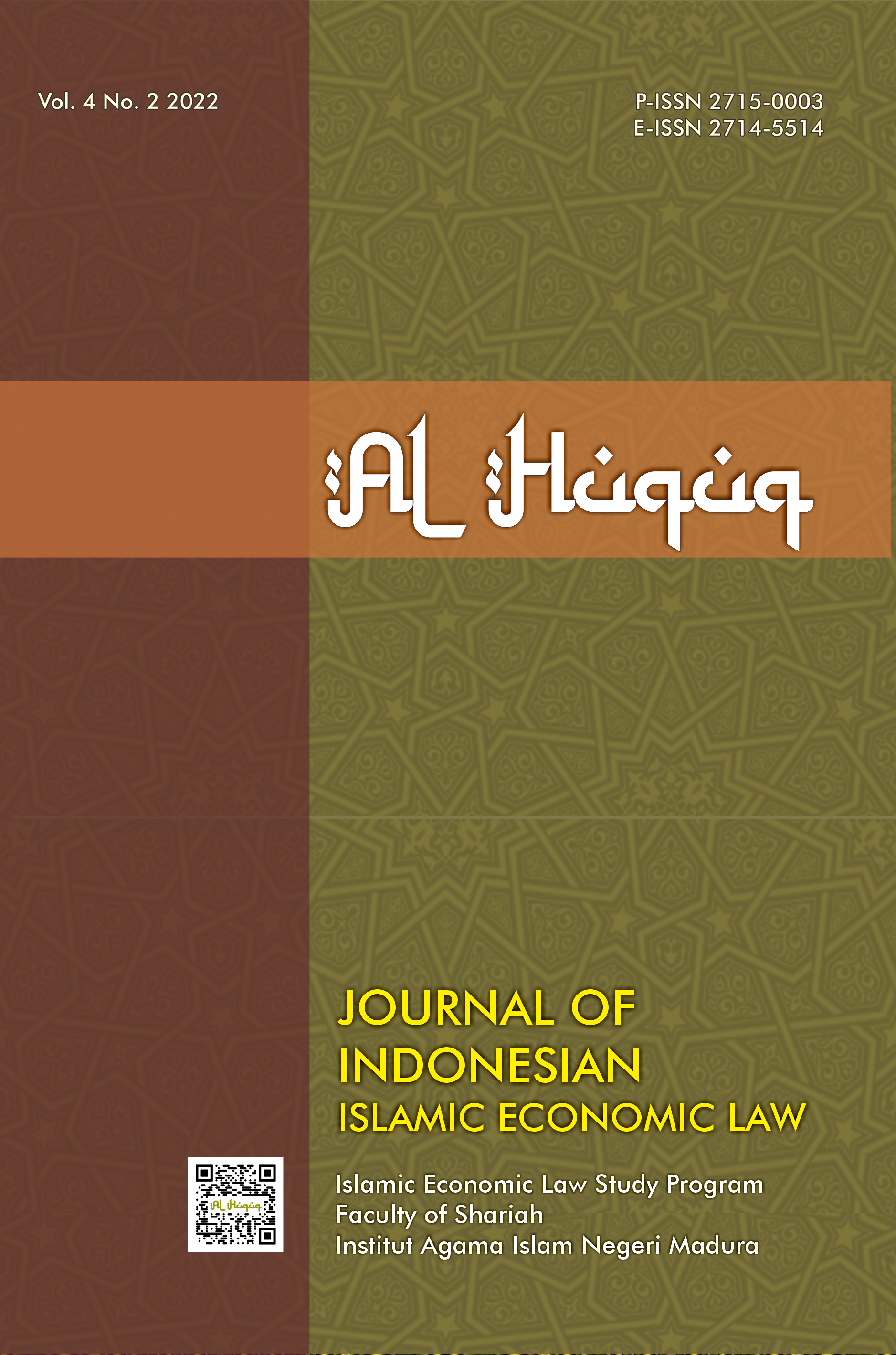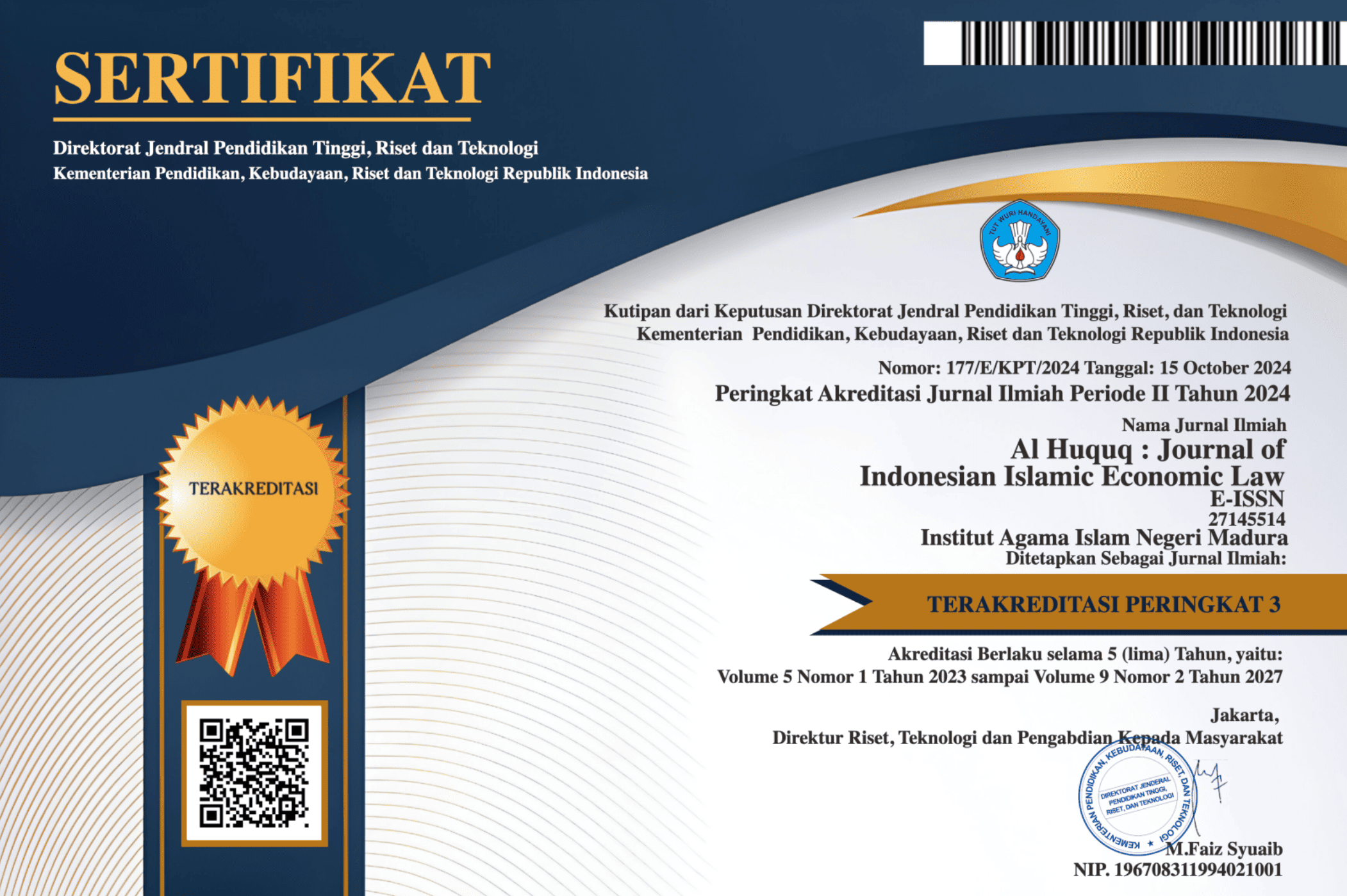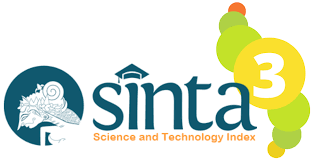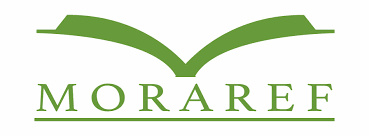Peran Platform Digital dalam Sertifikasi Halal UMKM Pasca Ditetapkan Undang-Undang Nomor 11 Tahun 2020 Tentang Cipta Kerja di Era Pandemi Covid-19
 Abstract views: 300
,
Abstract views: 300
,
 PDF downloads: 211
PDF downloads: 211
Abstract
Penelitian ini berangkat dari realitas empiris keberadaan platform digital (Go Food, Grab Food dan Shopee Food) dan perannya dalam sertifikasi halal produk UMKM di Indonesia. Metode yang digunakan dalam penelitian ini terdiri dari jenis penelitian lapangan, yang mengandalkan data primer dan sekunder yang diperoleh melalui wawancara dan studi dokumen. Data tersebut dianalisis secara deskriptif kualitatif. Adapun hasil penelitian yang telah dilakukan di atas dapat ditarik dua kesimpulan, yaitu pertama. Platform digital (Go Food, Grab Food dan Shopee Food) secara faktual dalam ketentuan yang tertera di websitenya tidak menjadikan kehalalan produk menjadi syarat bagi UMKM untuk bermitra dengannya, sehingga dapat dikatakan tidak berperan dalam upaya percepatan. sertifikasi halal produk UMKM di Indonesia, kedua, ada beberapa peran yang dapat diambil oleh platform digital (Go Food, Grab Food dan Shopee Food) untuk membantu percepatan sertifikasi halal produk UMKM, yaitu: (1) kampanye, sosialisasi dan edukasi tentang urgensi sertifikasi halal produk UMKM, (2) fasilitasi aspek pembiayaan sertifikasi halal produk UMKM melalui dana CSR, (3) menjadikan halal produk UMKM sebagai mitra. (This research departs from the empirical reality of the existence of digital platforms (Go Food, Grab Food and Shopee Food) and their role in halal certification of MSME products in Indonesia. The method used in this research consists of the type of field research, which relies on primary and secondary data obtained through interviews and document studies. These data were analyzed descriptively qualitatively. As for the research that has been done above, two conclusions can be drawn, namely first. Digital platforms (Go Food, Grab Food and Shopee Food) factually in the provisions listed on their website do not make product halal a condition for MSMEs to partner with them, so it can be said that they do not play a role in efforts to accelerate the halal certification of MSME products in Indonesia, secondly, there are several roles that can be taken by digital platforms (Go Food, Grab Food and Shopee Food) to help accelerate the halal certification of MSME products, namely: (1) campaigns, socialization and education on the urgency of MSME product halal certification, (2) facilitation in the financing aspect of MSME product halal certification through CSR funds, (3) make the halal products of MSMEs as partners.)
Downloads
References
Agustina, Yuli, Heri Pratikto, Madziatul Churiyah, and Buyung Adi Dharma. “Pentingnya Penyuluhan Sertifikasi Jaminan Produk Halal Untuk Usaha Kecil Menengah (UKM).” Jurnal Graha Pengabdian 1, no. 2 (2019): 139–50. http://journal2.um.ac.id/index.php/jgp/article/view/11090.
Ali, Muchtar. “The Concept of Halal Food in Sharia Perspective and Product Responsibility of Halal Industr.” Ahkam: Jurnal Ilmu Syariah 16, no. 2 (2016): 291–306. https://doi.org/10.15408/ajis.v16i2.4459.
Anastasya Riris Edelia, Rinitami Njatrijani, Sartika Nanda Lestari. “Tanggung Jawab Pt Grab Indonesia Terhadap Kerugian Dalam Proses Pengangkutan Barang Melalui Layanan Grab Express.” DIPONEGORO LAW JOURNAL 8, no. 2 (2019): 825–35.
ELVIAN SUDIRMAN. “Perlindungan Hukum Bagi Pengguna Jasa Transportasi Online Di Kota Makassar (Studi Pengguna Jasa Grab Motor (Grabbike) Di Lingkungan Fakultas Ilmu Sosial Unm).” Tomalebbhi: Jurnal Pemikiran , Penelitian Hukum, Pendidikan Pancasila Dan Kewarganegaraan 5, no. 1 (2018): 107–15.
Faridah, Hayyun Durrotul. “Halal Certification in Indonesia; History, Development, and Implementation.” Journal of Halal Product and Research 2, no. 2 (2019): 68. https://doi.org/10.20473/jhpr.vol.2-issue.2.68-78.
Izella, Vania, and Simbolon Remista. “PENGARUH PROMO SHOPEEFOOD TERHADAP MINAT BELI PENGGUNA SHOPEE (Di Daerah Tangerang Selatan).” Fakultas Ekonomi Universitas Advent Indonesia, 2021, 46–58.
John L. Esposito. Ensiklopedi Oxford, Dunia Islam Modern. Terj. Eva. Bandung: Mizan, 2002.
May Lim Charity. “Jaminan Produk Halal Di Indonesia.” Jurnal Legislasi Indonesia 14, no. 1 (2017): 99–108.
Musataklima, Musataklima. “Self-Declare Halal Products for Small and Micro Enterprises: Between Ease of Doing Business and Assurance of Consumer Spiritual Rights.” De Jure: Jurnal Hukum Dan Syar’iah 13, no. 1 (2021): 32–52.
Nathalia, Henry Brown, and Irwansyah Irwansyah. “Aplikasi Transportasi Online GO-JEK Bentuk Dari Konstruksi Sosial Teknologi Dalam Media Baru.” Mediator: Jurnal Komunikasi 11, no. 2 (2018): 227–35. https://doi.org/10.29313/mediator.v11i2.3737.
Oktaviani, Maria, Dharma Nurhalim, Adnres, and Erni Hernawati. “An Analysis of Go-Food, Grabfood, and Shopeefood Utilization to Improve Customer Loyalty on Home-Based Business Owners in Tangerang City.” Primanomics: Jurnal Ekonomi Dan Bisnis 19, no. 3 (2021): 1–10.
Otti Ilham Khair, Catur Widiatmoko, Rajanner P. Simarmata. “ANALISIS UU CIPTA KERJA DAN KEMUDAHAN BERUSAHA BAGI UMKM.” Syntax Literate: Jurnal Ilmiah Indonesia 7, no. 2 (2022): 1–12. http://www2.warwick.ac.uk/fac/sci/whri/research/mushroomresearch/mushroomquality/fungienvironment%0Ahttps://us.vwr.com/assetsvc/asset/en_US/id/16490607/contents%0Ahttp://www.hse.gov.uk/pubns/indg373hp.pdf.
Sugiyanto, Eviatiwi Kusumaningtyas, Sri Yuni Widowati, and Ratna Wijayanti. “Pola Pengelolaan Program Csr Untuk Meningkatkan Daya Saing Umkm.” Jurnal Dinamika Sosial Budaya 19, no. 2 (2018): 240. https://doi.org/10.26623/jdsb.v19i2.985.
Wu, Yi Chi, Ching Sung Chen, and Yu Jiun Chan. “The Outbreak of COVID-19: An Overview.” Journal of the Chinese Medical Association 83, no. 3 (2020): 217–20. https://doi.org/10.1097/JCMA.0000000000000270.
Copyright (c) 2022 Al-Huquq: Journal of Indonesian Islamic Economic Law

This work is licensed under a Creative Commons Attribution-ShareAlike 4.0 International License.















